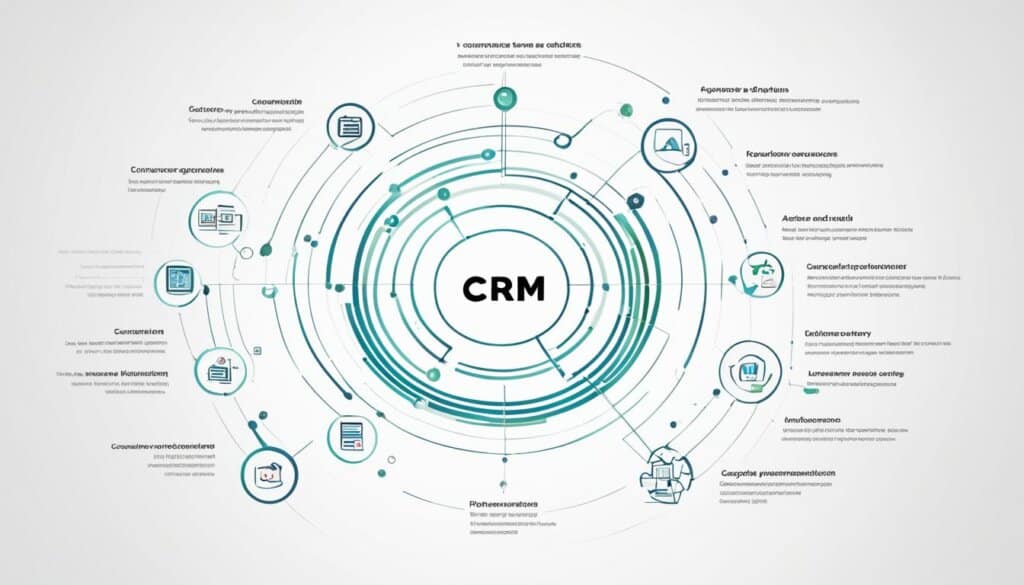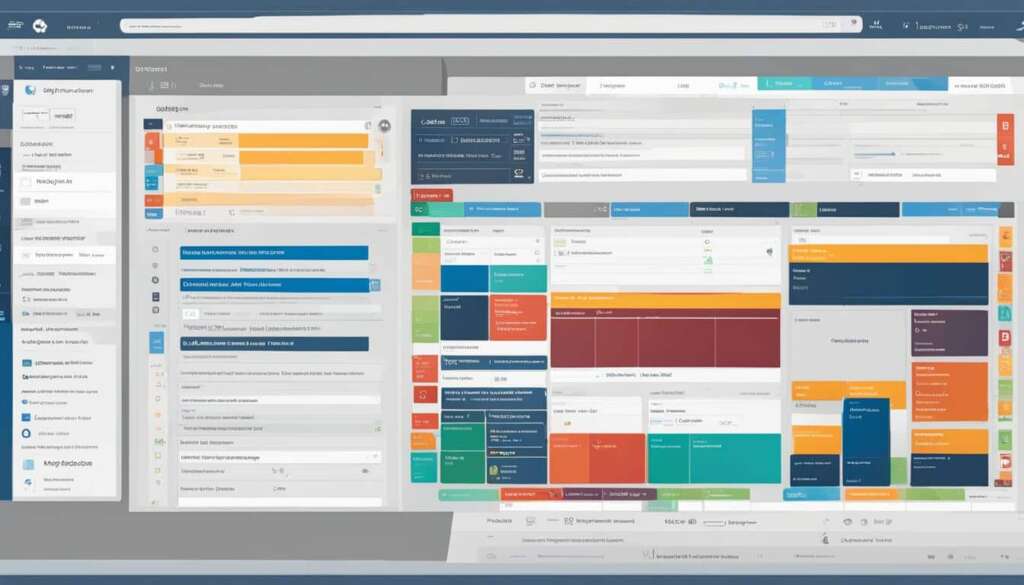Table of Contents
A CRM system, or customer relationship management system, is a powerful technology that helps businesses improve their relationships and interactions with customers. The main goal of a CRM system is to enhance business relationships and ultimately drive growth and profitability.
By implementing a CRM system, companies can stay connected to their customers, streamline processes, and improve overall profitability. This tool assists with contact management, sales management, agent productivity, and more. It enables businesses to manage customer relationships across the entire customer lifecycle, from marketing and sales to digital commerce and customer service interactions.
A CRM system is beneficial for all lines of business, including sales, customer service, business development, marketing, and more. It provides a centralized location for storing customer information, promoting collaboration, and increasing productivity. With worldwide spending on CRM systems expected to reach USD $114.4 billion by 2027, having a CRM strategy in place is crucial for long-term success.
Who Can Benefit from CRM?
A CRM system is designed to benefit all lines of business within an organization. It can provide value to sales teams, customer service representatives, business development professionals, marketers, and more. CRM tools allow users to store customer and prospect contact information, identify sales opportunities, record service issues, and manage marketing campaigns. The system provides a central location for all customer interactions and makes this information accessible to anyone in the organization who may need it.
CRM can benefit companies of all sizes, but it can be especially beneficial for small businesses that need to do more with less. It helps teams collaborate, increases productivity, and provides visibility into customer communication and purchase history, allowing for personalized and targeted interactions.
“CRM systems enable businesses to effectively manage customer relationships across departments, ensuring a seamless experience for customers from start to finish.”
The Benefits of CRM for Various Business Roles
| Business Role | Benefits of CRM |
|---|---|
| Sales Teams | Improved sales pipeline management, enhanced lead tracking, and increased revenue opportunities. |
| Customer Service Representatives | Better customer issue resolution, access to complete customer information for personalized service, and improved customer satisfaction. |
| Business Development Professionals | Streamlined prospecting and lead management, improved opportunity tracking, and increased conversion rates. |
| Marketers | Targeted marketing campaigns, personalized customer communication, and effective campaign management. |
CRM systems provide valuable tools and insights for these business roles and more, empowering organizations to deliver exceptional customer experiences and drive business growth.
What Does a CRM System Do?
A CRM system is a comprehensive solution that helps businesses find new customers, win their business, and keep them satisfied by organizing customer and prospect information. It tracks every customer interaction and provides a complete record of individuals and companies, allowing for a better understanding of the relationship over time.
CRM systems include various functionalities such as marketing automation, sales force automation, contact center automation, geolocation technology, workflow automation, lead management, analytics, artificial intelligence, project management, and integration with other software. These features enable businesses to:
- Manage day-to-day customer activities
- Engage prospects with targeted marketing campaigns
- Track sales pipeline and forecast accurately
- Deliver personalized customer service across channels
- Automate contact center tasks
- Create geographically targeted marketing campaigns
- Optimize business processes
- Manage leads
- Analyze user data for targeted marketing campaigns
- Enhance project management
CRM systems are constantly evolving to incorporate new technologies and provide businesses with the tools they need to effectively manage customer relationships.
“A CRM system is like the central nervous system of a business, allowing it to coordinate and synchronize all customer-related activities.”
With a CRM solution, businesses can organize customer information, build strong relationships, track customer interactions, and share information across departments, leading to improved collaboration and customer satisfaction. It streamlines day-to-day activities, automates processes, and provides valuable insights through analytics and artificial intelligence.
“A CRM system is a key driver for businesses seeking to optimize operations, enhance customer experiences, and drive growth.”
By utilizing CRM technology, businesses can effectively manage customer relationships and gain a competitive edge in the market. With integrated features such as marketing automation, sales force automation, and contact center automation, businesses can streamline their operations and provide personalized experiences to their customers.

Why Does Your Business Need CRM?
A comprehensive Customer Relationship Management (CRM) system is vital for businesses aiming to enhance customer service, gain valuable insights, and streamline tasks. By utilizing a CRM system, businesses can leverage advanced analytics to identify customer trends and make data-driven decisions.
A substantial benefit of CRM systems is their ability to connect various business silos, offering all departments a comprehensive view of customers. This fosters effective collaboration within the organization, resulting in connected customer experiences and improved customer satisfaction.
Implementing a CRM system directly impacts the bottom line, leading to increased sales, improved customer retention, and a positive impact on overall profitability. CRM systems enable businesses to create personalized marketing campaigns based on customer preferences, resulting in higher customer engagement and conversion rates.
Furthermore, a CRM system streamlines workflow processes, driving optimal efficiency and productivity. By optimizing business processes through automation, businesses can focus on enhancing customer service, improving sales performance, and fostering increased customer loyalty.
Key Benefits of CRM:
- Improve customer service through enhanced insights and personalized interactions
- Automate tasks to streamline workflow and increase productivity
- Gain comprehensive analytics to make data-driven decisions
- Connect business silos for more effective collaboration
- Optimize business processes for improved efficiency
- Enhance customer satisfaction and retention
- Increase sales through targeted marketing campaigns
- Drive business growth through better customer management
Incorporating a CRM system into your business operations can result in significant improvements across various areas, including customer service, sales performance, and overall profitability. With enhanced customer insights, streamlined processes, and targeted marketing campaigns, businesses can expect to see improved customer satisfaction, increased sales, and ultimately drive long-term growth.
To better understand the benefits of CRM and its impact on businesses, it is essential to analyze real-world case studies where organizations have successfully implemented CRM systems. The following table highlights some key statistics showcasing the positive outcomes achieved by businesses using CRM:
| Improved Metrics | CRM Adoption Rate |
|---|---|
| Customer satisfaction | 45% |
| Sales forecast accuracy | 65% |
| Customer retention | 60% |
| Marketing campaign ROI | 75% |
| Sales productivity | 50% |
By implementing a CRM system, businesses gain a comprehensive understanding of their customers, which is vital for success in today’s competitive market. With improved customer service, streamlined processes, and enhanced marketing strategies, a CRM system can be the driving force behind a business’s growth and success.
Comparing CRM Systems: Desktop, Server, and Cloud-based
When it comes to CRM systems, businesses have three main options to consider: desktop, server, and cloud-based. Each type offers distinct advantages and considerations, making it crucial for businesses to weigh their needs and resources.
A desktop CRM system operates on a single computer and is suitable for individual users who require basic contact management. It is a cost-effective solution for small-scale operations. On the other hand, a server CRM system involves a centralized database stored on a server, requiring software installation on each user’s PC or laptop. It offers greater control but requires upfront capital investment and maintenance of servers.
Alternatively, a cloud-based CRM system is hosted online by a third-party provider, offering businesses secure access to their CRM system from any internet-connected device. With minimal capital investment required, cloud-based systems provide cost-effectiveness, mobility, and disaster recovery features. Crucially, security and maintenance are handled by the CRM provider as part of the monthly service fee. Moreover, cloud-based CRM systems offer scalability, easy customization, integration options, and automatic updates and upgrades, enhancing competitiveness and adaptability.
Ultimately, businesses must consider factors such as cost, security and maintenance requirements, competitiveness, mobility, and disaster recovery capabilities when choosing the right CRM system. By understanding the differences between desktop, server, and cloud-based systems, organizations can make informed decisions and leverage the power of CRM to improve customer relationships, streamline processes, and drive business growth.
FAQ
What is a CRM system?
A CRM system, or customer relationship management system, is a technology that helps businesses manage their relationships and interactions with customers and potential customers. Its goal is to improve business relationships and ultimately grow the business by allowing companies to stay connected to customers, streamline processes, and improve profitability.
Who can benefit from CRM?
CRM systems can benefit all lines of business within an organization, including sales, customer service, business development, and marketing. It provides a centralized location for storing customer information, allows for collaboration and increased productivity, and enables personalized and targeted interactions with customers.
What does a CRM system do?
A CRM system is a comprehensive solution that helps businesses find new customers, win their business, and keep them satisfied by organizing customer and prospect information. It tracks every customer interaction, provides a complete record of individuals and companies, and includes functionalities such as marketing automation, sales force automation, contact center automation, lead management, analytics, and integration with other software.
Why does your business need CRM?
Implementing a CRM system can improve customer service, provide better insights, and automate tasks. It allows businesses to make data-driven decisions, connect business silos, deliver connected customer experiences, and experience increased sales, improved customer satisfaction, and better customer retention. CRM also enables personalized marketing campaigns, streamlined workflows, optimized processes, and overall business growth.
What are the different types of CRM systems?
There are three main types of CRM systems: desktop, server, and cloud-based. A desktop system runs on a single computer and is suitable for basic contact management. A server system involves a central database and requires software installation on each user’s PC or laptop. A cloud-based system is hosted online and allows businesses to access their CRM system anywhere with an internet connection, offering scalability, mobility, cost-effectiveness, and security.












